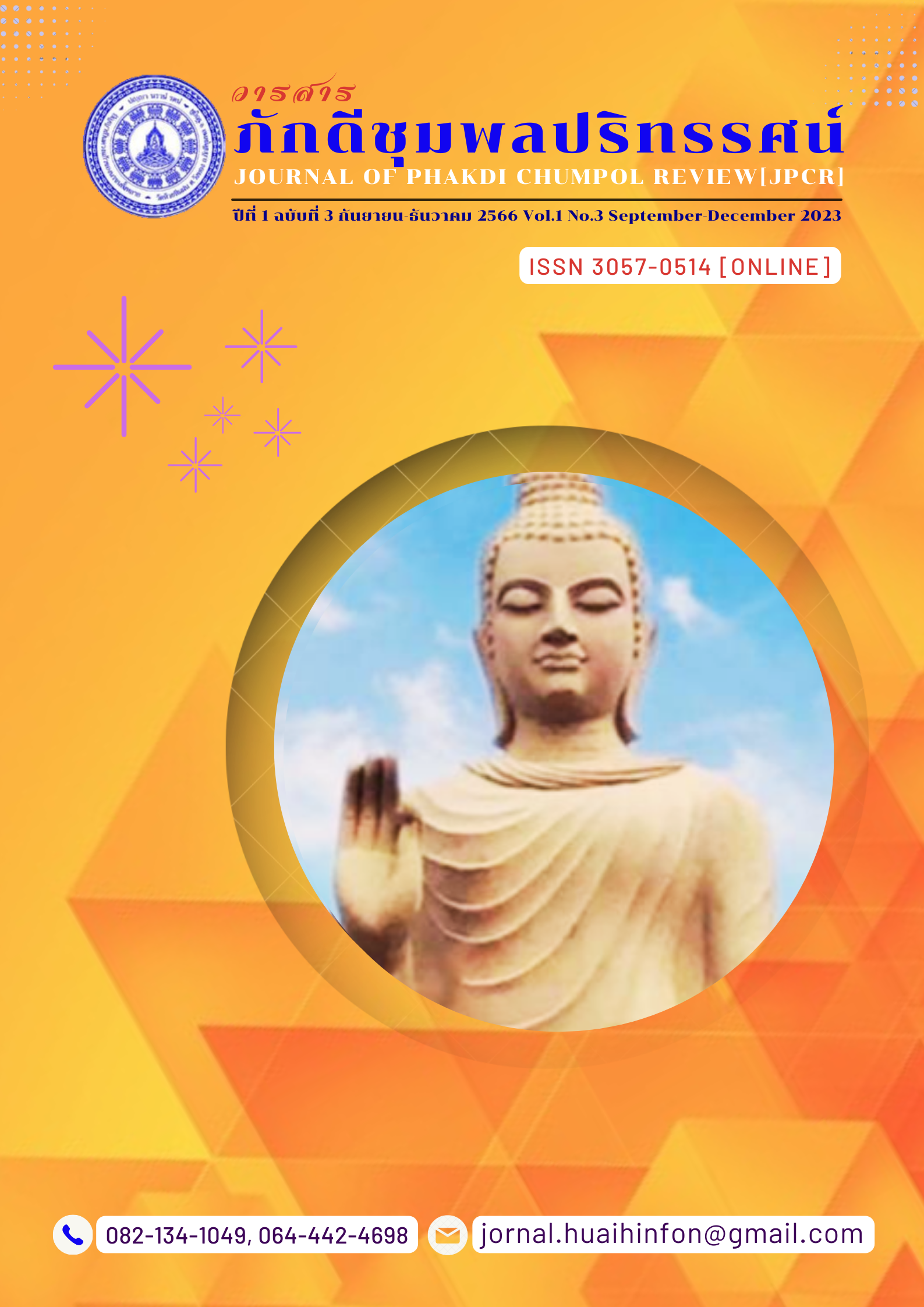Integration of Brahma Vihara Dhamma for Promoting Government Leadership
Keywords:
Integration of Brahma Vihara Dhamma, Promoting, Government LeadershipAbstract
Leadership is important in every organization. A leader is a person who has power, influence, or the ability to influence, create, and instill faith to create cooperation in organizational management Have courage Be decisive and not greedy. Has the ability to lead the organization's personnel to achieve common goals. It is an influential relationship between leaders and followers. This results in changes for the better in both personal and organizational interests.
The 4 Brahma Vihara Dhamma are the most important basic moral virtues for leaders. It is an excellent virtue for leaders to have towards their subordinates. It is a moral principle that one should practice oneself. Leaders should integrate these moral principles which will lead the organization to success and efficiency. And live happily, there are 4 aspects 1) For characteristic according to Brahma Vihara Dhamma, Local rulers should have morality and ethics in governing. 2) For behavior according to Brahma Vihara Dhamma, Local rulers should have love and compassion for the people. Should be decisive and strong and patient. There should be justice. 3) For situation according to Brahma Vihara Dhamma, Local rulers should have courage, dare to think, dare to make decisions, and should know how to adapt to the modern era. Should have a broad vision in governance. 4) For changing according to Brahma Vihara Dhamma, Local rulers should dare to make changes in order to develop governance of the people for a better living. Should have creativity in community development.
References
กุญชลี วรรณโร. (2563). บทบาทการปกครองท้องที่ในปัจจุบัน : การศึกษาความคิดเห็นของกำนัน ผู้ใหญ่บ้านและผู้ช่วยผู้ใหญ่บ้านในพื้นที่อำเภอควนเนียง จังหวัดสงขลา. สารนิพนธ์รัฐประศาสนศาสตรมหาบัณฑิต, สาขาวิชารัฐประศาสนศาสตร์, บัณฑิตวิทยาลัย, มหาวิทยาลัย สงขลานครินทร์.
เจ้าอธิการวิชัย วิชโย (พลโยธา). (2565). ภาวะผู้นำทางการปกครองของเจ้าอาวาสตามความคิดเห็นของประชาชนในตำบลธาตุทองอำเภอภูเขียว จังหวัดชัยภูมิ. สารนิพนธ์รัฐศาสตรมหาบัณฑิต, สาขาวิชารัฐศาสตร์, บัณฑิตวิทยาลัย, มหาวิทยาลัยมหาจุฬาลงกรณราชวิทยาลัย.
ติน ปรัชญพฤทธิ์. (2527). “ภาวะผู้นำและการมีส่วนร่วม”. เอกสารการสอนชุดวิชาพฤติกรรมมนุษย์ ในองค์การหน่วยที่ 11 มหาวิทยาลัยสุโขทัยธรรมาธิราช. นนทบุรี: มหาวิทยาลัยสุโขทัยธรรมาธิราช.
ประคัลภ์ ปัณฑพลังกูร. (2567). 5 คุณสมบัติสำคัญของการเป็นผู้นำที่ดี. [ออนไลน์]. แหล่งที่มา: https://prakal.wordpress.com/2010/06/ [21 กุมภาพันธ์].
ปุระชัย เปี่ยมสมบูรณ์. (2550). ผู้นำที่ดีไม่มีเสื่อม. กรุงเทพฯ: สำนักพิมพ์อนิเมทกรุ๊ป.
พระครูสุตวรธรรมกิจ (เติม โสภโณ). (2561). ภาวะผู้นำเชิงกลยุทธ. กรุงเทพฯ: บริษัทน้ำทิพย์ทัวร์.
พระธรรมปิฎก (ป.อ. ปยุตฺโต). (2546). ภาวะผู้นำ. พิมพ์ครั้งที่ 7. กรุงเทพฯ: สุขภาพใจ.
พระธรรมปิฎก (ป.อ. ปยุตฺโต). (2540). พระพุทธศาสนาพัฒนาคนและสังคม. กรุงเทพฯ: กองการพิมพ์ฝ่ายประชาสัมพันธ์ กฟผ.
พระราชวรมุนี (ประยูร ธมฺมจิตฺโต). (2541). คุณธรรมสำหรับนักบริหาร. พิมพ์ครั้งที่ 2. กรุงเทพฯ: มูลนิธิพุทธรรม.
พระศรีปริยัติโมลี (สมชัย กุสลจิตฺโต). (2547). สงฆ์ผู้นำสังคม. กรุงเทพฯ: โรงพิมพ์มหาจุฬาลงกรณราชวิทยาลัย.
พระสราวุธ สุขิโต (ปัดจะมะ). (2558). “การประยุกต์ใช้หลักธรรมพรหมวิหาร 4 ในการบริหารงานของบุคลากรองค์การบริหารส่วนตำบลสะอาดสมบูรณ์อำเภอเมือง จังหวัดร้อยเอ็ด”. วารสารมหาวิทยาลัยมหามกุฏราชวิทยาลัย วิทยาเขตร้อยเอ็ด, ปีที่ 4 ฉบับที่ 1 (มกราคม-มิถุนายน).
มหาจุฬาลงกรณราชวิทยาลัย. (2539). พระไตรปิฎกภาษาไทย ฉบับมหาจุฬาลงกรณราชวิทยาลัย. กรุงเทพฯ: โรงพิมพ์มหาจุฬาลงกรณราชวิทยาลัย.
เศาวนิต เศาณานนท์. (2542). ภาวะผู้นำ. นครราชสีมา: สถาบันราชภัฏนครราชสีมา.
สำนักงานคณะกรรมการกฤษฎีกา. (2567). พระราชบัญญัติลักษณะปกครองท้องที่พุทธศักราช 2457. [ออนไลน์]. แหล่งที่มา: https://www.songkhla.go.th/files/com_news_laws/2021-04_79d783bbf560239pdf [2 มีนาคม 2566].
เสริมศักดิ์ วิศาลาภรณ์. (2540). ภาวะผู้นำ : ทฤษฎีและแนวปฏิบัติในการบริหารการศึกษา. นนทบุรี: มหาวิทยาลัยสุโขทัยธรรมาธิราช.




